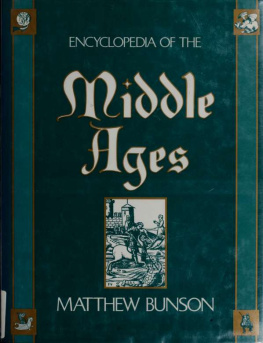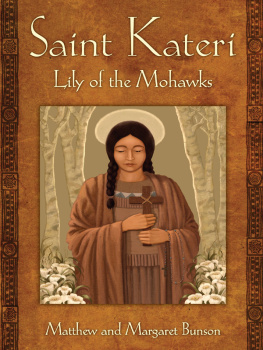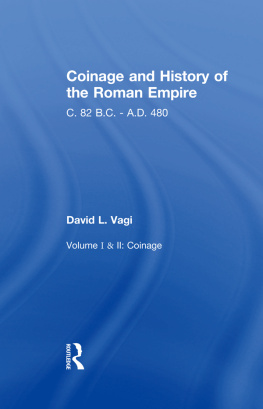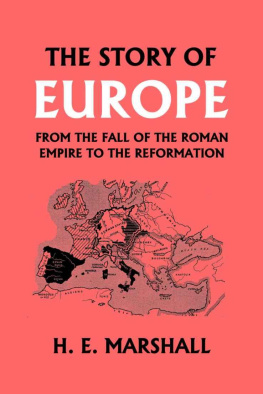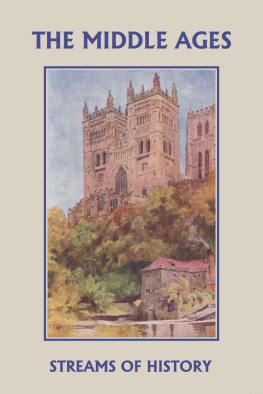This book made available by the Internet Archive.
Introduction
For centuries, the Middle Ages were the subject of minor interest to scholars, poets, writers and intellectuals, who considered the period to be one of little creativity, important social development or intellectual progress. The philosopher Hegel, for example, once declared that, if it were possible, he would use a pair of seven-league boots to step over the 1,000 years encompassing medieval philosophy and thus avoid everything from the sixth century until the time of Rene Descartes in the 17th century. This low opinion of the Middle Ages first emerged during the Renaissance, when humanists comparing the previous centuries with the rebirth of classical learning and artistic achievements of their own era found the former wanting. Petrarch coined the term "Dark Ages," a pejorative that seemed to illustrate the dimming of culture and the arts in a decayed, ruined world defined by barbarian invasions, superstition, chronic outbreaks of epidemics and stultified social and political systems.
Thanks to the work of countless scholars, however, we know today that the Middle Ages was a vibrant, interesting and progressive period, one of great significance in human history. It is accepted now that the contributions of medieval artisans, philosophers, architects, merchants and writers were significant, enduring and as worthy as those of any other age. Further, the term Dark Ages does not reflect the conditions found in Europe or elsewhere during the Middle Ages and does nothing to illustrate such enormous events as the construction of the Hagia Sophia by the Byzantines, the flowering of the Carolingian Renaissance under Charlemagne and the sophistication of Cordoba under the Moors.
This representative list of notable developments also suggests one of the important truths of the Middle Ages, and that is that medieval culture was not confined in some isolated fashion to Europe. We are indebted to those scholars who have recognized the many cultures present in the medieval epoch and who have examined the exchange among societies that flourished in Africa, Moorish Spain, the Near East and the Far East as well as in western Europe. Modern scholarship has encouraged understanding of the period by making available a vast treasury of historical writings and analyses documenting the affairs of peoples in Africa, Asia, the Middle East and especially the Americas. Europe was not alone.
The Encyclopedia of the Middle Ages has been written with
this wider perspective in mind. While space limitations prevented the inclusion of every significant region that was notable in the medieval millennium, much attention has been paid to the significant non-European cultures that held a prominent role in the shaping of Western and Near Eastern civilization. The reader will find coverage not only of the West but of the Byzantine Empire; the Islamic dynasties, including those of North Africa and Spain; the Balkan empires such as those of the Bulgars and Serbs; and the Mongols.
For the individual who comes to the Encyclopedia of the Middle Ages with a limited familiarity with the subject, it might prove useful to follow a few guidelines in starting out, particularly as the number of entries and their complexity can at first be somewhat daunting. A study of the chronology at the beginning of the book will be helpful in establishing a framework of reference for later reading. A glance at the glossary will help familiarize the reader with many of the terms or concepts that appear in the A to Z text. From here, one might consult the broader entries (Art and Architecture, Banking, Germany, Holy Roman Empire, Universities, Warfare, etc.) for more detailed aspects of the material. For instance, those interested in the Byzantine Empire should begin with that entry and then proceed to Art and Architecture, Byzantine; Warfare; Constantinople; and the individual entries on the emperors. From these stem other entries (Iconoclasticism, Crusades) of possible interest. Throughout, the entries have been cross-referenced with related topics, and various charts, maps and genealogies have been included to enhance clarity. (Genealogies of ruling dynasties include regnal dates unless otherwise indicated.) Finally, readers should use the Suggested Reading List as the starting point of additional study, bearing in mind that it offers only a fraction of the innumerable works now available. The works listed are recommended to add a deeper understanding of the Middle Ages and to increase awareness of the events that led up to this period and that were in turn influenced by it.
A NOTE ON ALPHABETIZATION The first element of many Arab names, e.g., el- or al-, is left at the start of the name though the complete name is alphabetized according to the second element. For example, al-Mus-tansir, al-Mustasim, and al-Mutannabi are left as written but placed under M rather than A.
CHRONOLOGY OF MEDIEVAL HISTORY
410 -1492
DATE EVENT
410 Rome is sacked by the Visigoths under Alaric.
418 Visigoths settle in Aquitaine.
426 St. Augustine completes De civitate Dei (The City of God).
429 Vandals under Geiseric invade Africa at the invitation of the Roman general Boniface.
430 Death of St. Augustine of Hippo. Patrick is sent to Ireland as a missionary.
439 Writing of the Codex Theodosianus.
Fall of Carthage to the Vandals.
449 Invasion of Britain by the Saxons and Angles.
451 Battle of Chalons; defeat of Attila the Hun.
452 Invasion of Italy by Attila the Hun.
453 Death of Attila the Hun.
455 Rome is sacked by the Vandals.
456 Kirig Theodoric II establishes Visigoth kingdom in Spain. 468 Destruction of the Eastern imperial fleet by the Vandals.
471 German general Aspar is assassinated, reducing Germanic influence in the Eastern Empire.
476 Fall of the Roman Empire in the West with the deposition of Emperor Romulus Augustulus by
Odoacer, a German (Herulian) leader.
484 A schism begins between the Eastern and Western Churches.
488 Italy is invaded by the Ostrogoths under Theodoric.
493 Odoacer is murdered after surrendering to Theodoric at Ravenna.
496 Defeat of the Alamanni by the Salian Franks led by Clovis.
507 Defeat of the Visigoths in southern France by Clovis.
508 Paris (Roman, Lutetia) is chosen by the Franks as their capital.
519 A reconciliation between Eastern and Western Churches is achieved.
524 Execution of the Roman consul and writer Boethius by Theodoric the Great.
525 Cosmas Indicopleustes journeys up the Nile River; he extends his travels to Ceylon.
526 Death of Theodoric the Great.
527-565 Reign of the Byzantine emperor Justinian I.
529 Foundation of Monte Cassino near Naples by Benedict of Nursia, bringing monasticism to the West.
Justinian closes the academy at Athens, founded in 347 b.c. by Plato.
532 Justinian, urged by his wife Theodora, brutally represses the Nika Revolt.

